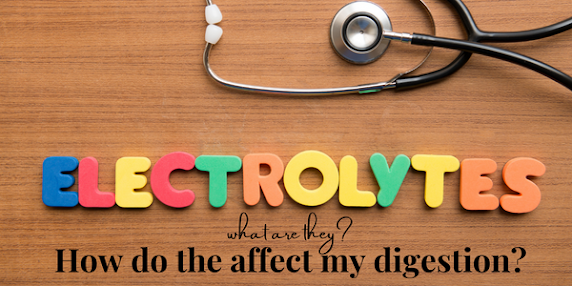What Are Electrolytes and How Do They Affect Your Digestion?
We've all heard that electrolytes are essential for staying hydrated, especially during intense physical activities. But these essential minerals do more than just help us replenish fluids. They are also important for regulating nerve and muscle function, balancing pH levels, and aiding in digestion. So, what exactly are electrolytes, and how do they affect your digestion? In this post, we will explore these essential minerals and their importance in maintaining a healthy digestive system.
Firstly, let's define what electrolytes are. Electrolytes are charged minerals that conduct electrical impulses in our body, helping to regulate various functions. Electrolytes are primarily found in bodily fluids like blood, sweat, and urine. Some of the most important electrolytes include sodium, potassium, magnesium, calcium, and chloride.
Now, let's talk about how electrolytes affect your digestion. Electrolytes play a crucial role in maintaining the acid-base balance of your digestive system. Your body's pH level needs to be within a certain range for optimal digestion to occur. Electrolytes like sodium and chloride help to maintain this balance by neutralizing stomach acid and aiding in the breakdown of food.
Furthermore, electrolytes also aid in the absorption of nutrients in the small intestine. The absorption of essential nutrients like vitamins, minerals, and amino acids is essential for optimal health. Electrolytes like magnesium and calcium play a vital role in this process by regulating the movement of nutrients through the intestinal wall and into the bloodstream.
Electrolytes are also important for regulating bowel movements. The proper balance of electrolytes helps to ensure that your bowel movements are regular and healthy. Sodium and potassium are particularly important for regulating the movement of fluids in and out of your intestinal cells, which helps to prevent constipation and diarrhea.
Finally, it's worth mentioning that inadequate electrolyte levels can have a negative impact on your digestive system. A deficiency in electrolytes can lead to electrolyte imbalances, which can cause digestive symptoms like bloating, constipation, and diarrhea. In extreme cases, electrolyte imbalances can even lead to life-threatening conditions like heart failure.
In summary, electrolytes are essential minerals that play a vital role in maintaining a healthy digestive system. They help to regulate the pH balance, aid in nutrient absorption, regulate bowel movements, and prevent digestive symptoms. Overall, understanding the role of electrolytes in your digestion can help you make informed choices to support your overall health and wellness.
Firstly, let's define what electrolytes are. Electrolytes are charged minerals that conduct electrical impulses in our body, helping to regulate various functions. Electrolytes are primarily found in bodily fluids like blood, sweat, and urine. Some of the most important electrolytes include sodium, potassium, magnesium, calcium, and chloride.
Now, let's talk about how electrolytes affect your digestion. Electrolytes play a crucial role in maintaining the acid-base balance of your digestive system. Your body's pH level needs to be within a certain range for optimal digestion to occur. Electrolytes like sodium and chloride help to maintain this balance by neutralizing stomach acid and aiding in the breakdown of food.
Furthermore, electrolytes also aid in the absorption of nutrients in the small intestine. The absorption of essential nutrients like vitamins, minerals, and amino acids is essential for optimal health. Electrolytes like magnesium and calcium play a vital role in this process by regulating the movement of nutrients through the intestinal wall and into the bloodstream.
Electrolytes are also important for regulating bowel movements. The proper balance of electrolytes helps to ensure that your bowel movements are regular and healthy. Sodium and potassium are particularly important for regulating the movement of fluids in and out of your intestinal cells, which helps to prevent constipation and diarrhea.
Finally, it's worth mentioning that inadequate electrolyte levels can have a negative impact on your digestive system. A deficiency in electrolytes can lead to electrolyte imbalances, which can cause digestive symptoms like bloating, constipation, and diarrhea. In extreme cases, electrolyte imbalances can even lead to life-threatening conditions like heart failure.
In summary, electrolytes are essential minerals that play a vital role in maintaining a healthy digestive system. They help to regulate the pH balance, aid in nutrient absorption, regulate bowel movements, and prevent digestive symptoms. Overall, understanding the role of electrolytes in your digestion can help you make informed choices to support your overall health and wellness.

Comments
Post a Comment